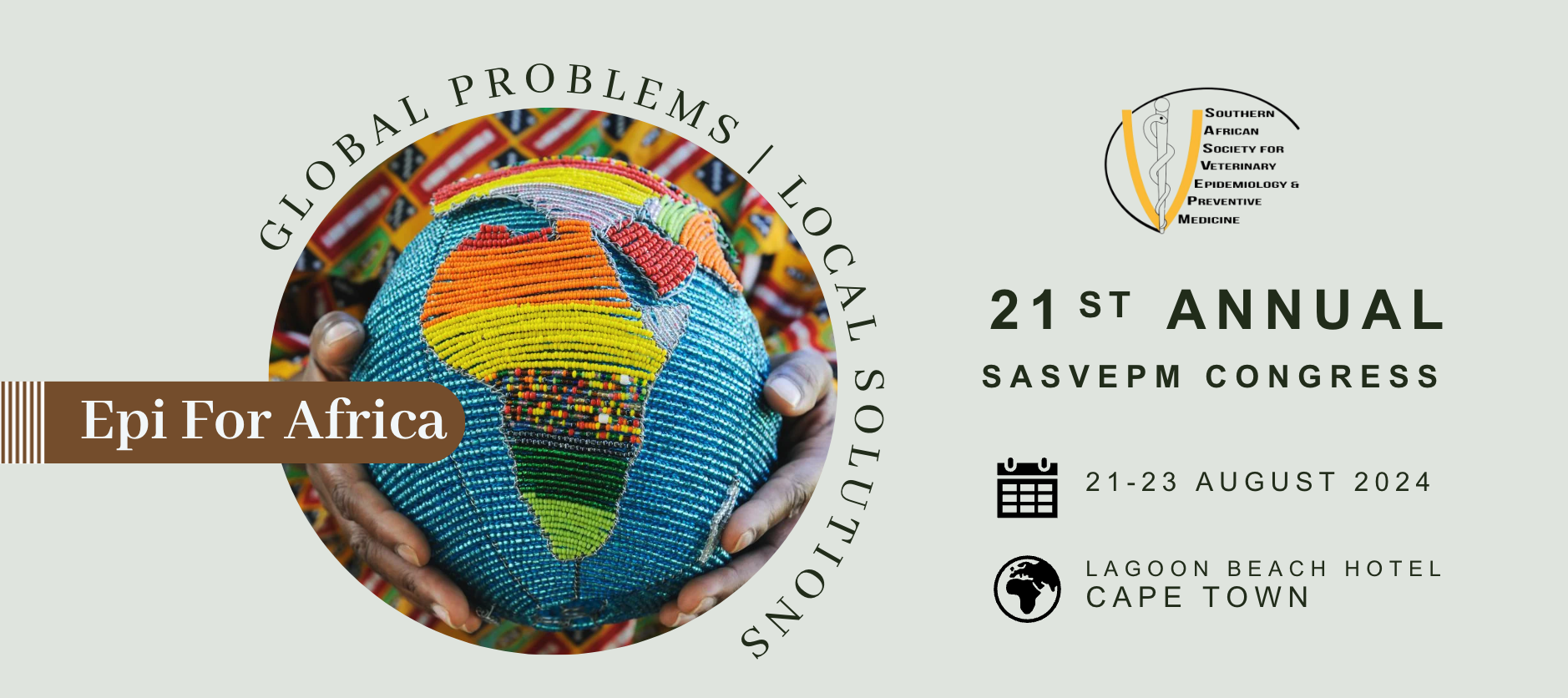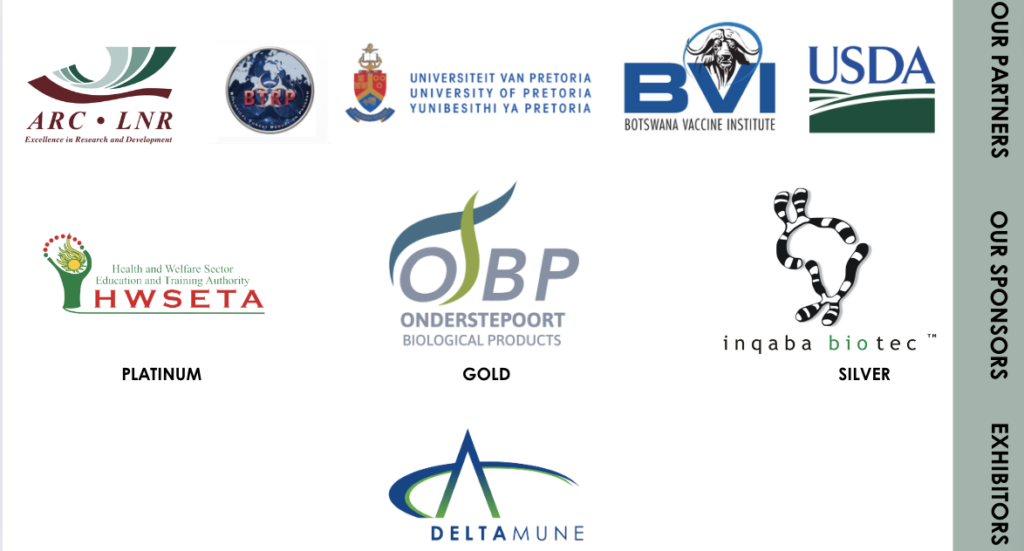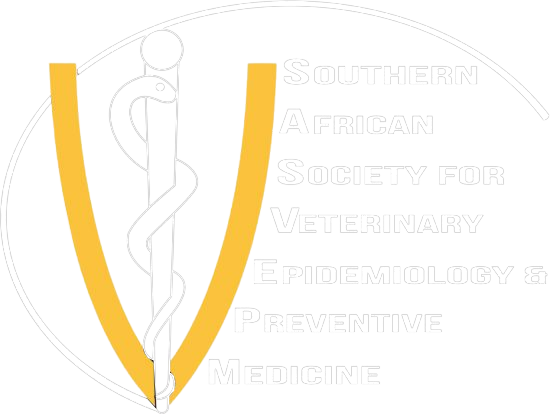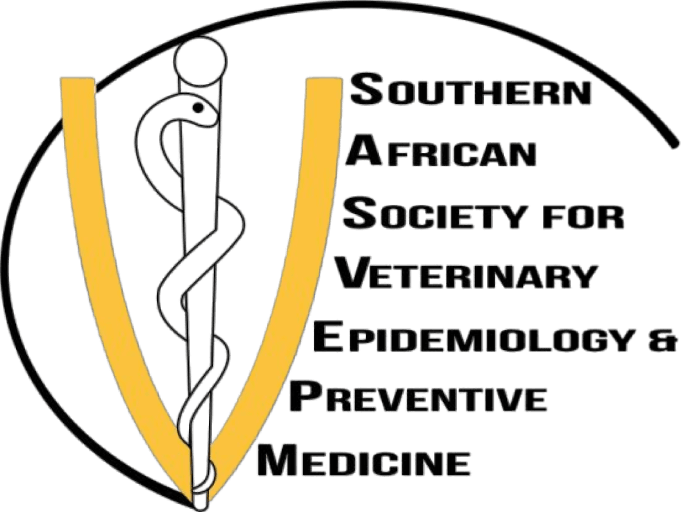
The Southern African Society for Veterinary Epidemiology and Preventive Medicine (SASVEPM) is pleased to announce its 21st Annual Congress, which will take place from 21 to 23 August 2024 at the Lagoon Beach Hotel, Cape Town.
Epi for Africa: Global Problems | Local Solutions
Africa is arguably the continent at highest risk from infectious diseases, but often struggles to implement internationally recommended veterinary surveillance and control measures successfully. This is not only due to severe resource limitations and lack of capacity, but also inexorably linked to the highly heterogeneous nature of our terrain, peoples, animals, and climate. To truly understand the complex eco-epidemiological landscapes of Africa requires creative approaches to data collection and disease surveillance, holistic control measures, participatory approaches, interdisciplinary efforts, and community involvement.
This year’s SASVEPM congress features the unique problems and circumstances faced in animal health and welfare on the African continent and explores practical and sustainable local and regional solutions. We believe that only by developing Afro-centric approaches to address global problems will we have a chance at finding the sustainable solutions we need to flourish as a continent.
The 21st SASVEPM congress serves as a strong multinational networking platform to build and foster collaborative research and enhance communication across disciplines, professions, and sectors. Join us for this exciting event which brings together veterinarians, para-veterinarians, and researchers from the southern African region and beyond. Participants interested in presenting oral or poster presentations are invited to submit abstracts under the theme “Epi for Africa: Global Problems | Local Solutions”.
The congress app can be viewed on your computer browser here https://eventee.co/event/84179. If you attended the congress in person, you need to go to settings (on the app) and change it to virtual mode to see the videos. The app is now locked with a pin code, use the pin code that was send by email
-
Download the Abstract book on the congress app
-
Congress Photos are available on congress app
-
Powerpoints & replays is available on the congress app where you can view them for the next 6 months


Dr. Nenene Qekwana
Dr. Daniel Nenene Qekwana (BSc, BVSc, MMedVet, PhD) is a recognized specialist in veterinary public health and an associated professor in the Department of Paraclinical Sciences at the Faculty of Veterinary Science, University of Pretoria where he is involved in teaching and training of undergraduate and postgraduate students in epidemiology, food safety, zoonotic diseases, and public health. After completing his PhD in epidemiology, he has conducted research on various topics including spatio-temporal changes in disease outbreaks, drivers of antimicrobial resistance in humans and animals, and the impact of policy decision/formulation from a justice perspective.
Dr. Qekwana is currently the Head of the Department of Paraclinical Sciences and a member of the Faculty of Veterinary Sciences research ethics committee. He has served as part of the Ministerial Advisory Committee on Antimicrobial Resistance (MAC-AMR) until the end of 2023 and continues to serve as a member of the Gauteng Provincial Antimicrobial Stewardship Committee.

Dr. Anne Conan
Dr. Anne Conan is a researcher in epidemiology at the French Agricultural Research and International Cooperation Organization (CIRAD, France) and is attached to the Research Platform - Production and Conservation in Partnership (RP-PCP) based at the University of Zimbabwe. She specializes in infectious diseases and zoonoses in low-income areas.
Her main research topics include the surveillance of infectious diseases at the wildlife interface, the consequences of intensification of chicken farming in Asia (One Health Poultry Hub), the epidemiology of African swine fever in pigs, the epidemiology of Coxiella burnetii in humans and livestock, and the control of rabies in humans and dogs. She is a research fellow at the One Health Research Foundation.
Dr. Conan completed her DVM and MSc in epidemiological surveillance in 2008. She worked at the Public Health and Epidemiology Department in Pasteur Institute in Cambodia for five years. After completing her PhD in Epidemiology in 2013, Dr Conan started a post-doctorate fellowship at the Department of Veterinary Tropical Diseases at the University of Pretoria (South Africa). She then joined Ross University School of Veterinary Medicine (St. Kitts and Nevi, West Indies) in 2015 as a post-doctorate fellow before becoming an Assistant Professor in Epidemiology. After spending three years at City University of Hong Kong as research assistant professor and then research associate professor, she joined CIRAD in November 2022.

Dr. Locksley Messam
Dr. Locksley Messam (BSc., Dr. Med. Vet., PhD ) is a tenured lecturer at University College Dublin’s School of Veterinary Medicine. He is a veterinary epidemiologist with both methods-related and applied research interests, including epidemiologic study design, the validation and application of diagnostic tests and the effects of human-animal interactions on human health and wellbeing. A staunch advocate of the application of epidemiologic approaches to study design, data analysis and inferences, he maintains that studies claiming to be epidemiologic in nature, should be designed, conducted, and make inferences in ways that are recognisably consistent with the central concepts and methods of the discipline.
Having conducted research in Europe, North America and the Caribbean, Dr. Messam has substantial experience in the efficient conduct of epidemiologic studies requiring empirical data collection in a variety of cultural contexts. A native Jamaican, he is a graduate of the University of the West Indies, Jamaica, University of Veterinary Sciences, Hungary, and the University of California Davis, USA, where he did his undergraduate, veterinary and doctoral studies, respectively. A firm believer that formal training in epidemiology is invaluable to grasping the discipline’s approach to inference, he has taught epidemiology to veterinary and graduate students in the Caribbean, North America and Europe and has conducted a number of workshops on epidemiologic methods at the Society for Veterinary Epidemiology and Preventive Medicine’s (SVEPM) conferences. Since 2022, Dr. Messam has also been a member of SVEPM’s executive committee.
You can find out more about Dr. Messam on his webpage: https://people.ucd.ie/locksley.messam
| 17:00 | Registration opens | ||
| 18:00-19:30 | Welcome Reception – Lagoon Beach Hotel | ||
| Wednesday, 21 August 2024 | |||
| Time | Theme | Title | Speaker |
| 7:00 | Registration – Arrival Coffee & Tea in Exhibition Area | ||
| SESSION CHAIR: Dr. Mohamed Sirdar | |||
| 8:00 | Opening Session | Welcome & Opening Remarks | Mohamed Sirdar (SASVEPM President) |
| 8:30 | Epidemiological Methods | Keynote 1: The (un)Common Sense of Epidemiologic Inference: Why Training is A Must | Locksley Messam |
| 9:30 | Descriptive epidemiology and spatio-temporal analysis of African swine fever outbreaks in South Africa: 2012-2023 | Oonagh Pretorius | |
| 9:50 | Veterinarians’ perceptions of beef cattle farmer’s knowledge and practices of biosecurity in Western Australia | Lebogang Mnisi | |
| 10:10 | Introduction of Sponsors | Chris Marufu (SASVEPM VP) | |
| 10:20 | Mid-morning refreshments | ||
| SESSION CHAIR: Dr. Tandile Ndobeni | |||
| 10:50 | Epidemiological Methods | Evaluation of expert opinion elicitation in the context of foot-and-mouth disease control | Mohamed Sirdar |
| 11:10 | Gut microbiome of wildtype Tabanus par (Walker, 1854) using metagenomics approach. | Emily Emsley | |
| 11:30 | Animal Welfare | Welfare status of dairy cows reared from large scale dairy farms in Midlands Province –Zimbabwe | Zivanayi Matore |
| 11:50 | Are you an ethical professional? The updated South African National Standard for the Care and Use of Animals for Scientific Purposes (SANS 10386:2021) | Bert Mohr | |
| 12:10 | Special Theme | Income generation and curbing fuel costs by use of Donkeys, Mules and Horses | Benedict Mhletywa |
| 12:30 | Poster Session 1 | ||
| 13:00 | Lunch | ||
| SESSION CHAIR: Prof. Nkululeko Nyangiwe | |||
| 14:00 | Unique African Epidemiological Challenges & Solutions | Context-specific solutions for African Horse Sickness in South Africa: enhancing ASD through integrated reporting | Camilla Weyer |
| 14:20 | State veterinary laboratory’s role in the control of diseases: challenges and perspectives. | Mulunda Mwanza | |
| 14:40 | Molecular and serological prevalence of corridor disease (buffalo associated Theileria parva infection) in cattle populations at the livestock/game interface of Kwazulu-Natal Province, South Africa | Sikhumbuzo Mbizeni | |
| 15:00 | Dog-mediated human rabies elimination in Nigeria by 2030 – will dog markets stifle progress towards elimination? | Ukamaka Eze | |
| 15:20 | Special Theme | Sharing elephant dung with traditional healers: from dung heap to beacon of hope | Lin-Mari de Klerk-Lorist |
| 15:40 | Wellness Tea | ||
| 15:50 | Wellness session | How to cultivate mental-emotional wellbeing, reduce stress and anxiety, and be well from the inside out – practical tips and exercises to change your life forever | Bert Mohr |
| 16:30 | End of Day One | ||
| Thursday, 22 August 2024 | |||
| Time | Theme | Title | Speaker |
| 7:00 | Registration – Arrival Coffee & Tea in Exhibition Area | ||
| SESSION CHAIR: Dr. Oonagh Pretorius | |||
| 8:00 | One Health Approaches: Integrating Human, Animal, and Environmental Health | Keynote 2: One Health: Is Conceptualisation a Barrier to its Operationalisation? | Anne Conan |
| 9:00 | A “One Health” perspective of Africa-wide distribution and prevalence of Giardia species in humans, animals and environment: A systematic review and meta-analysis | Mpho Tawana | |
| 9:20 | Exploring the Impact of Temperature Variation on Bacterial Growth Dynamics in Coastal Marine Ecosystems amidst Climate Change | Ekemini Okon | |
| 9:40 | In-vitro antimicrobial activity of crude extracts of Combretum molle leaf- A One Health Approach | Joshua Ngwisha | |
| 10:00 | Occurrence and characterization of Shiga toxin-producing Escherichia coli and Enteropathogenic Escherichia coli isolates from cattle and calves on communal rangeland in Gauteng, South Africa. | Mogaugedi Malahlela | |
| 10:20 | Mid-morning refreshments | ||
| SESSION CHAIR: Dr. Wonderful Shumba | |||
| 10:45 | One Health Approaches: Integrating Human, Animal, and Environmental Health | Unravelling bacterial communities in Diptera flies from livestock kraals and residential dumping sites using metataxonomic approach | Lara de Wet |
| 11:05 | Growth, Health and Environmental Impacts of Feed additive Use and Regulatory Frameworks in Aquaculture | Ekemini Okon | |
| 11:25 | Gold sponsor presentation – OBP | ||
| 11:40 | Disease Prevention & Control in Low Resource Settings | Knowledge of ticks and tick-borne diseases and tick control strategies among communal farmers in Mafikeng Local Municipality | Pfano Theweli |
| 12:00 | “Guilty until proven innocent”, the only way to optimize control of transboundary animal disease in South Africa, an African swine fever case report. | Agatha Raseasala | |
| 12:20 | Bridging policy and science: Public-Private Partnerships revitalizing South Africa’s equine trade prospects | John Grewar | |
| 12:40 | Poster Session 2 | ||
| 13:10 | Lunch | ||
| SESSION CHAIR: Mrs. Thembakazi Xoxo | |||
| 14:00 | Disease Prevention & Control in Low Resource Settings | Enhancing Veterinary Service Provision for Smallholder Farmers in Zimbabwe: An Integrated Approach | Leonard Maposa |
| 14:20 | Evaluation of the proper use of medication available over the counter by subsistence in Mpumalanga Province. | Japhta Mokoele | |
| 14:40 | FAO Expert Consultation on acaricide resistance of cattle ticks: A case study of the Eastern Cape Province in South Africa | Nkululeko Nyangiwe | |
| 15:00 | Special Theme | Meat safety risk of unapproved stamped carcasses sold at butcheries of Mpumalanga | Mpendulo Xashimba |
| 15:15 | Mid-afternoon refreshments | ||
| 15:30 | SASVEPM AGM | ||
| 17:00 | End of Day Two | ||
| SASVEPM 21st ANNUAL CONGRESS CELEBRATION & AWARDS | |||
| Moyo – Kirstenbosch | |||
| Dress code: Unique African Dress | |||
| 18:00 | Shuttles depart Lagoon Beach Hotel | ||
| 19:00 | Congress Dinner & Awards | ||
| 21:30 | First shuttle leaves back to LBH | ||
| 23:00 | Last shuttle leaves back to LBH | ||
| Friday, 23 August 2024 | |||
| Time | Theme | Title | Speaker |
| 7:00 | Registration – Arrival Coffee & Tea in Exhibition Area | ||
| SESSION CHAIR: Prof. Chris Marufu | |||
| 8:00 | Antimicrobial Resistance | Keynote 3: AMR Surveillance & Control in an African Setting | Nenene Qekwana |
| 9:00 | Antibiotic quality and use practices amongst dairy farmers and drug retailers in central Kenyan highlands | Dishon Muloi | |
| 9:20 | Molecular comparative study of antibiotic resistance of Salmonella enterica from animals, food and environment isolated over 62 years. | Nozipho Maphori | |
| 9:40 | Genomic characterization of generic Escherichia coli from food-producing animals and products of animal origin, in South Africa | Refiloe Malesa | |
| 10:00 | Antimicrobial patterns of ESKAPE pathogens isolated from the hands of students in a Veterinary Academic Hospital, South Africa. | Dikeledi Sebola | |
| 10:20 | Veterinary antibiotic traces in formal and informal red meat slaughtered food animals in the West Coast District of the Western Cape | Victor Twala | |
| 10:40 | Mid-morning refreshments | ||
| SESSION CHAIR: Dr. Itumeleng Matle | |||
| 11:10 | State of the Continent: Disease rich, data poor | Analysis of mannose-binding lectin protein and mRNA levels on selected chicken breeds in South Africa | Peter Ayodeji Idowu |
| 11:30 | The bacterial community harboured by Amblyomma hebraeum ticks from livestock in North West Province, South Africa | Kealeboga Mileng | |
| 11:50 | Bacillus anthracis in South Africa, 1975-2013: are some lineages vanishing? | Kgaugelo Lekota | |
| 12:10 | Temporal and Serotypic Dynamics of Actinobacillus pleuropneumoniae in South African Porcine Populations: A Retrospective Study from 1985 to 2023 | Emmanuel Seakamela | |
| 12:30 | Poster Session 3 | ||
| 13:00 | Lunch | ||
| SESSION CHAIR: Dr. Nyeleti Manganyi | |||
| 14:00 | State of the Continent: Disease rich, data poor | Rift Valley fever: questioning dogma and debunking myths | Peter Thompson |
| 14:20 | Retrospective Analysis of Serotype Distribution in Mannheimia haemolytica, Pasteurella multocida, and Bibersteinia trehalosi Isolates: Insights from 50 Years of Specimen Data at Onderstepoort Veterinary Research Laboratory. | Itumeleng Matle | |
| 14:40 | Wildlife Epidemiology | Tuberculosis in a Skukuza vervet monkey troop – a monkey on the back of the One Health concept? | Lin-Mari de Klerk-Lorist |
| 15:00 | Species composition of ticks (Acari: Ixodidae) infesting selected wild ungulates from two protected wildlife management areas in Northern Botswana | Obuile Owen Raboloko | |
| 15:20 | Black-backed jackal-associated rabies case in white rhino from North-West Province, South Africa | Chuene Ernest Ngoepe | |
| 15:40 | Translocation risk assessment model for white rhinoceroses (Ceratotherium simum) from wildlife populations infected with tuberculosis, South Africa | Oonagh Pretorius | |
| 16:00 | Closing Ceremony | Closing, vote of thanks, awards | Mohamed Sirdar & Oonagh Pretorius |
| 16:30 | End of Congress | ||
| Day 1 – 19 August 2024 | Workshop Title: Veterinary Laboratories Biosafety and Biosecurity Fundamentals |
Workshop Objectives | • Enhance participants’ understanding of biosafety and biosecurity principles in veterinary laboratories. |
| • Develop practical skills in PPE donning and doffing. | |
| • Foster knowledge of international biosafety frameworks and their application. | |
| • Improve risk assessment and management capabilities. | |
| Facilitator: Dr Paidamwoyo Berry Mutowembwa | |
| Workshop Programme | |
| 7:30 | Arrival Tea & Registration |
8:00 | Introductions and Pre-Workshop Assessment |
| • Welcome and Opening Remarks by Workshop Convener | |
| • Opening of the workshop by the SASVEPM President | |
| • Self-introductions by all delegates | |
| • Pre-evaluation test on Laboratory biosafety/biosecurity principles. | |
8:30 | Introduction to Biosafety/ biosecurity Concepts |
| • Definition of biosafety and biosecurity. | |
| • Laboratory Biosafety and Biosecurity Fundamentals-Definitions, concepts and importance | |
| • Identification of potential hazards in veterinary laboratories. | |
9:30 | BSLs and Matching Practices to Specific Veterinary Pathogens |
| • Explanation of Biosafety Levels (BSL-1 to BSL-4). | |
| • Correlation of pathogens to appropriate BSLs. | |
| • Standard microbiological practices for different BSLs. | |
| • Case studies of pathogen handling and containment. | |
| 10:30 | Morning Tea/Coffee Break |
| 11:00 | Practical Demonstration: PPE Donning and Doffing |
12:00 | International Biosafety/Biosecurity Frameworks |
| • Overview of global standards and guidelines and their relevance to animal health | |
| 13:00 | Lunch Break |
14:00 | Case Studies: Analyzing Biosafety Practices in Real-world Scenarios |
| • Group work on real-world biosafety scenarios. | |
| • Identification of potential risks and corrective actions. | |
| • Discussion and sharing of findings. | |
| 15:00 | Overview of Bio risk Management. |
15:30 | Principles of Risk assessment, evaluation and mitigation |
| • Discussion of the pre-evaluation test after the course. | |
| Adjournment | |
| Day 2 – 20 August 2024 | Veterinary Method Validation |
| Facilitator: Dr Alison Baratang Lubisi | |
| 7:00 | Arrival Tea |
7:30 | Why must diagnostic tests be validated |
| • Importance of accurate and reliable test results | |
| • Regulatory requirements | |
| • Impact of inaccurate results on animal health and welfare | |
| • Case studies | |
| 8:45 | Questions and comments |
9:00 | Assay development pathway |
| • Essential pre-requisites: | |
| o Target analyte, matrix, and interference identification | |
| o Regulatory considerations | |
| o Resource allocation and personnel | |
| • Study design and protocol: | |
| o Defining study objectives and endpoints | |
| o Sample collection and handling | |
| o Data management | |
| • Reagents and controls: | |
| o Sourcing and quality assessment | |
| o Preparation and stability | |
| • Calibration to standards: | |
| o Standard selection and preparation | |
| o Calibration curve generation and validation | |
| 10:30 | 10:30 – 11:00 Tea Break |
11:00 | Stage 1: Analytical characteristics |
| • Analytical sensitivity and specificity: | |
| o Limit of detection (LOD) and quantification (LOQ) | |
| o Cross-reactivity and specificity evaluation | |
| • Repeatability: | |
| o Intra-assay variation assessment | |
| • Preliminary reproducibility: | |
| o Inter-assay variation assessment | |
12:00 | Stage 2: Diagnostic Characteristics |
| • Diagnostic sensitivity: | |
| o True positive rate determination | |
| • Diagnostic specificity: | |
| o True negative rate determination | |
| • Cut-off point adjustment: | |
| o Optimization for desired sensitivity and specificity | |
| 13:00 | Lunch |
13:45 | Stage 3: Reproducibility |
| • Full reproducibility: | |
| o Inter-laboratory and long-term stability assessment | |
| Stage 4: Implementation | |
| • Validation report generation | |
| • Quality control procedures | |
| • Ongoing monitoring and reassessment | |
| Validation status retention | |
| • Requirements for maintaining validation | |
| • Revalidation timelines | |
| End of workshop | |
| Closing Remarks: Deputy President : SASVEPM |
Conference Organiser
conferences@vetlink.co.za
012 346 1590


